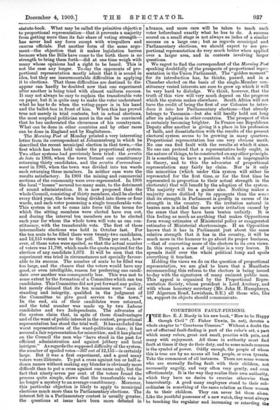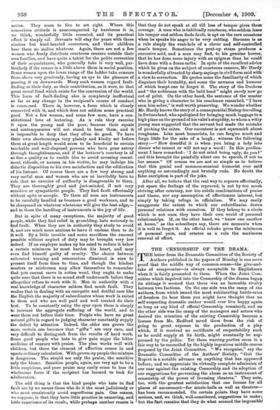COURTEOUS FAULT-FINDING.
THE Rev. E. J. Hardy in his new book," How to be Happy though Civil " (T. Fisher Unwin, 5s. net), devotes a whole chapter to " Courteous Censure." Without a doubt the art of effectual fault-finding is part of the ruler's art, a part which many rulers, great and small, practise with pain, and many with enjoyment. All those in authority must find fault at times if they do their duty, and to some minds censure is the symbol of power. Oddly enough, the people of whom this is true are by no means all bad people, or even tyrants. Take the commonest of all instances. There are some women who are eternally finding fault with their children, not necessarily angrily, and very often very gently, and even affectionately. It is the way they realise their own authority, which they have no desire. to exercise otherwise thai benevolently. A good many employers stand to their sub- ordinates in something of the same relation as these women do to their children. They can never let them alone. Like the youthful possessor of a new watch, they must always be touching the regulator and increasing or retarding the
action. They seem to live to set right. Where this censorious attitude is unaccompanied by harshness it ia, we think, wonderfully little resented, and its practical effect is simply nil. Servants will stay for years with these aimless but kind-hearted correctors, and their children bear them no malice whatever. Again, there are not a few women who freely distribute courteous censure outside their own families, and have quite a talent for the polite correction of their acquaintance, who generally take it very well, par- ticularly if the censor is a little above them in social position. Some women upon the lower rungs of the ladder take censure from above very graciously, having an eye to the pleasure of passing it on downwards. Many such women regard fault- finding as their duty, as their contribution, as it were, to that great moral fund which exists for the conversion of the world. This form of fault-finding also is completely ineffectual so far as any change in the recipient's course of conduct is eonctrned. There is, however, a form which is closely connected with it, and which does not seldom some practical good. Not a few women, and some few men, have a con- stitutional love of lecturing. As a rule they exercise it upon the young and the poor, because their equals and contemporaries will not stand to hear them, and it is impossible to deny that they often do good. To have their own shortcomings very plainly and kindly set before them at great length would seem to be beneficial to certain teachable and well-disposed persons who have gone astray through thoughtlessness, and if the lecturer's courtesy is of so fine a quality as to enable him to avoid arousing resent- ment, ridicule, or nausea in his victim, he may indulge his didactic disposition to his own satisfaction and the edification of his listener. Of course there are a few very strong and very useful men and women who are so inevitably born to rule that no exercise of authority is disagreeable to them. They are thoroughly good and just-minded, if not very sensitive or sympathetic people. They find fault effectually without spite or scruple. To them all men are instruments to be carefully handled as becomes a good workman, and to be sharpened on whatever whetstone will give the beat edge,— and to them the handling of instruments is the joy of life.
But in spite of many exceptions, the majority of good people, while they find relief in grumbling, hate seriously to find fault. When they are in authority they study to avoid it, and are much more anxious to leave it undone than to do it well. By a little trouble and some sacrifices the amount possible without neglect of duty may be brought very low indeed. If an employer makes up his mind to reduce it below a certain minimum he must harden his heart, and may even find himself guilty of cruelty. The choice between reiterated warning and remorseless dismissal is sure to present itself from time to time, and though the kindest masters or mistresses may allow themselves to remember that you cannot carve in rotten wood, they ought to make quite sure that there is no sound stuff underneath before they altogether refuse to work with it. Men in authority with a real knowledge of character seldom find much fault. They realise that in dealing with an energetic and dutiful race like the English the majority of subordinates whose work is suited to them and who are well paid and well treated do their best. To be constantly using the spur upon them is simply to increase the aggregate suffering of the world, and to wear them out before their time. People who have no great natural gifts in regard to judging character constantly supply the defect by attention. Indeed, the older one grows the more certain one becomes that " gifts " are very rare, and very difficult to distinguish from the results of hard work. Some good people who hate to give pain sugar the bitter medicine of censure with praise. The plan works well with children, but there the element of affection comes in and upsets ordinary calculation. With grown-up people the mixture is dangerous. The stupid see only the praise, the sensitive only the blame. Sensitive people, again, are very apt to be a little suspicious, and pure praise may easily come to lose its wholesome force if the recipient has learned to look for adulteration.
The odd thing is that the kind people who hate to find fault are by no means those who do it the most judiciously or who most consistently avoid superfluous pain. One reason, we suppose, is that they have little practice in censuring, and little experience of its reaulti while perhaps another reason is
that they do not speak at all till loss of temper gives them courage. A man who is habitually courteous, who seldom loses his temper and seldom finds fault, is apt on the rare occasions when he speaks his anger to be very cutting. Sarcasm is as a rule simply the vent-hole of a clever and self-controlled man's temper. Sometimes the pent-up steam produces a corrosive acid, and a man may find, to his genuine horror, that be has done more injury with an epigram than he could have done with a dozen oaths. In spite of the excellent advice which he gives on the subject of courteous censure, Mr. Hardy is wonderfully attracted by sharp sayings in civil form said with' a view to correction. He quotes some the familiarity of which disguises their brutality, and some the newness and humour of which tempt one to forget it. The story of the Duchess and " the nobleman with the bald head " might surely now go out of print. On the other hand, the sentence of the master who in giving a character to his coachman remarked, "I have seen him sober," is well worth preserving. We wonder whether Mr. Hardy knows the story of a consequential Bishop travelling in Switzerland, who apologised for bringing much luggage to a high place on the ground of his valet's stupidity, to whom a witty young man suggested that the servant had made the mistake of packing the mitre. Our raconteur is not squeamish about roughness. Like most humorists, he can forgive much and forgo little for the sake of a laugh ; witness the following story :—" How dreadful it is when you bring a lady into dinner who cannot or will not say a word! In this predica- ment I have remarked : ' I do not mind being ugly, do you l' and this brought the painfully silent one to speech, if not to her senses." Of course we are not so simple as to believe that this genial and common-sensical humorist ever said anything so astoundingly and brutally rude. No doubt the false ascription is part of the joke.
After all, we believe that the real way to reprove effectually; yet spare the feelings of the reproved, is not by too much striving after courtesy, nor too subtle combinations of praise and blame, nor any assumption of affectionate interest, but simply by taking refuge in officialism. We may easily exaggerate the extent to which our subordinates desire personal relations with ourselves. If they belong to a circle which is not ours, they have their own world of personal relationships. If on the other hand, we " know one another at home," as the schoolboys say, there are moments when it is well to forget it. An official rebuke gives the minimum of personal pain, and creates as a rule the maximum renewal of effort







































































 Previous page
Previous page